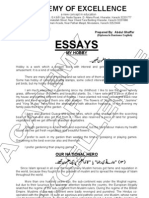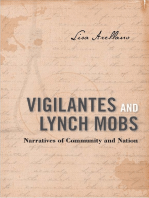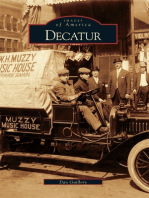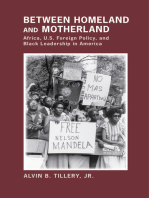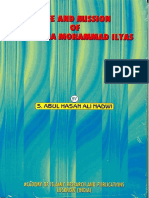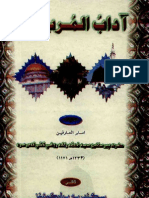Remembering (And Forgetting) African
Remembering (And Forgetting) African
Uploaded by
tioBigasCopyright:
Available Formats
Remembering (And Forgetting) African
Remembering (And Forgetting) African
Uploaded by
tioBigasOriginal Description:
Original Title
Copyright
Available Formats
Share this document
Did you find this document useful?
Is this content inappropriate?
Copyright:
Available Formats
Remembering (And Forgetting) African
Remembering (And Forgetting) African
Uploaded by
tioBigasCopyright:
Available Formats
Remembering (and forgetting) African Muslims in the Americas
[J A Progler] Hollywood's latest extravaganza, Amistad, is about Africans sold into slavery in 1839 who revolt and commandeer a slave ship with the intention of sailing back to Africa. Intercepted off the coast of New York, they are arrested and get entangled in a court case pitting abolitionist against pro-slavery forces. The film's director Steven Spielberg, like the makers of other 'great white hope' American films such as Dances with Wolves, focuses on the white man hero, former US president John Quincy Adams, who champions the Africans' case and eventually secures their freedom. (Hooray for the Great White American savior!) What is overlooked, however, is that among the slaves who revolted were men who spoke and understood Arabic. One even responded in kind to a missionary who tested him with the traditional Islamic greeting, Assalamu 'alaykum. Whichever way the story is told today, Amistad is a powerful reminder of the presence of Muslims in America during the period of slavery. If this part of the story sounds surprising, it is probably because of the confused and contradictory ways the Islamic legacy of African Americans has been handled by writers and historians. When Alex Haley asserted in his 1976 novel, Roots: The Saga of an American Family, that its main character Kunte Kinte was a Muslim, he was dismissed by many American historians. James Michenor, for example, labeled Haley's assertion as a 'sop' to contemporary developments and that it was not a 'true reflection' of the past, implying that Kunte Kinte's past reflected Haley's present, and especially his earlier collaboration on the Autobiography of Malcolm X. Even people who generally saw the overall value of Haley's work refused to appreciate the Islamic aspects of the story. Black nationalists usually distance themselves from the stories of African Muslims in slave America, as do most Christian-oriented thinkers of African descent. Islam is either denied as a part of Afro-American history, or, when its presence is acknowledged at all, it is invalidated by being labeled as 'just another slave religion' - this time of the Arabs. But despite what its detractors claim, Islam is a significant part of African American history and should be included in multicultural inspired revivals and remembrances. This is not to say that historians are not aware of a Muslim presence in early America. For example, noted historian John Blassingame, in his classic work, The Slave Community: Plantation Life in the Antebellum South (1979), found that 'Muhammadan' slaves continued to pray to Allah in the slave quarters. But this brief admission is overshadowed by a long polemic about slavery and Islam in North and West Africa. Adding to the confusion, Blassingame lumps together and freely interchanges terms that seem to mean the same thing, whereas they are in fact - the way he uses them - practically meaningless. Using the terms Arabs, Moors, Bedouins, Moslems, and Berbers in ways that are not clear, he also refers to religious wars between
'Christians and Moslems,' and to 'Arab privateers' and 'Moorish pirates' in the Mediterranean. His unexamined assumptions on these issues, coupled with their limited relevance to the topic at hand, seem to do nothing but reinforce preconcieved notions of the Islamic world as a savage and barbarous place. But were the wars which Blassingame speaks of solely 'religious'? Is Blassingame willing to place 'pirates' in the context of the Spanish Reconquista and Inquisition, or European colonization? Who were these 'pirates' and 'privateers,' and who do they represent? No context, no explanation; this borders on the exploitation of powerful and emotional images that have deep roots in Euro-American civilization, reaching back to the Crusades. Blassingame uses very limited and selective sources to tell his story of slavery in North and West Africa: a handful of travel or other writings by people who escaped from 'pirates' and 'privateers,' and two books on slavery in the region. There is a lot of spurious and politically motivated scholarship on this, and Blassingame appears to be using sources at face value that support his own pre-conceived notions, instead of using a critical eye to appraise them within the political context in which they may have been written. Tales of Arab, Moorish, Moslem (sic), Berber, Bedouin slavery, forced conversion of innocent Christians, lascivious sexual behaviour, and overall mindless and violent acts read like nothing more than a compendium of Crusader and Inquisition phantasms. Another noted American historian, Eugene Genovese, in Roll Jordon Roll: The World the Slaves Made (1976), also mentions Islam in the lives of African Americans. In his discussion of slave religion, he notes that slave interpretations of the prophets Moses and Jesus [upon them both be peace] were different than those of the white preachers, and notes that these interpretations might also have applied to the Prophet Muhammad [upon whom be peace]. Genovese states that Muhammad followed Jesus as Jesus followed Moses [upon them all be peace], but that slaves had 'too strong a grip on reality' to be concerned with the benefits of the afterlife, and were more concerned with the here and now. Genovese also notes that black preachers re-interpreted some of the messages of the Judeo-Christian prophets, for example the migration of Moses. He also mentions the Muslims' migration from Makkah to Medina. While Genovese's observations are somewhat sound (his portrayal of Muslim-led rebellions in Brazil in his book From Rebellion to Revolution is better than most), he is nevertheless operating under some assumptions that need to be clarified. Genovese seems to accept without question the notion that 'Muhammadan' slaves often equated the Prophet Muhammad with Jesus [upon them both be peace]. But this comes right out of antebellum Christian polemics by the likes of Rev. Charles C Jones, author of a notorious 1843 manual for slave holders, The Religious Instructions of the Negroes. Here is a misconception. Most Christian ministers did and do indeed give heavier weight to the afterlife, and often instruct their followers to 'turn the other cheek' in the face of injustice and oppression. Genovese realized that this was obviously not seen as sound to many slaves, but when he asserts that Africans developed a
modified form of Christianity based on their experiences, he forgets the possible influence of Islamic ideology on Christianity as it came to be practised among them. Islam does not teach turning the other cheek; instead, it calls upon its adherents to stand up and seek justice, and to protect themselves if necessary. Anyone who has read the Qur'an - whether they be African, Arab, Berber, Moor - will get this same message. So, while Genovese admits that Islamic ideology may have played a role in the Brazilian uprisings, he does not try to see how that ideology might have also had an impact - albeit in a different setting - upon at least some of the slave rebellions and other forms of resistance in North America. There are other clues to consider. Research in musicology has shown a strong possibility that Islamic musical sensibilities may have found their way to the 'new world' via the slave trade. However, if one insists on lumping all slaves together into one mass - which is still done by some scholars - then it becomes easy to deny the Islamic influences. No one will argue that there were not African influences on music in the Americas, but it can be argued that, while not always easy to disentangle what came from where, there must have been some kinds of Islamic influences on AfroAmerican musical forms and practices, especially regarding forms of liturgical chant. This is overshadowed by scholars who uniformly emphasize drumming and dance among many African peoples, usually giving this as the main contribution to AfroAmerican musics. African Muslims do not rely as much on drumming or dancing for their musical expressions. Muslims have developed and continue to develop musical forms using string instruments and relying on complex and embellished solo vocal lines - both features being very prevalent wherever one goes in the Muslim world. Some musicologists have tried to note this with varying degrees of success, but none of these ideas ever makes it into works such as Blassingame's or Genovese's. Arguments can be made for other Islamic concepts and practices being mingled with African, Christian and new world cultures. For example, there is the practice of 'conjuring,' which is often noted but not thought through. It is possible that some forms of conjuring - in particular those which rely on a written charm of some sort are clearly Islamic in origin. Muslim holy men and women in Africa are noted for making such charms, sometimes called hijab or hatumere, and which can consist of specially chosen verses from the Qur'an written on some medium and worn or carried by the believer for protection. While not all 'conjuring' can be described as from Muslim sources, by lumping it all together the historian denies an important aspect of diversity in the African-Islamic experience in the Americas. As a case in point, Makandal, who led a slave rebellion in Haiti and who remains an important figure in Haitian history, is often labeled as a 'conjurer,' practising voodoo. What is not usually mentioned is that he had a strong command of the Arabic language, which is strong evidence that Haiti's national hero was a Muslim.
You might also like
- Al Kitaab GrammarDocument7 pagesAl Kitaab Grammarcmcox22100% (1)
- Important Essays For Class IX-XDocument16 pagesImportant Essays For Class IX-Xhamza0071556% (18)
- Consent in the Presence of Force: Sexual Violence and Black Women's Survival in Antebellum New OrleansFrom EverandConsent in the Presence of Force: Sexual Violence and Black Women's Survival in Antebellum New OrleansNo ratings yet
- Before Equiano: A Prehistory of the North American Slave NarrativeFrom EverandBefore Equiano: A Prehistory of the North American Slave NarrativeNo ratings yet
- Educational Reconstruction: African American Schools in the Urban South, 1865-1890From EverandEducational Reconstruction: African American Schools in the Urban South, 1865-1890No ratings yet
- Islamic Studies Book 1Document251 pagesIslamic Studies Book 1Abu Nabila As SundawyNo ratings yet
- Ethics of AdvertisingDocument5 pagesEthics of AdvertisingJoshua Del RosarioNo ratings yet
- Mother and Son PlayDocument2 pagesMother and Son PlayEl Yamany NabilNo ratings yet
- Dissonant Worlds: Roger Vandersteene among the CreeFrom EverandDissonant Worlds: Roger Vandersteene among the CreeRating: 5 out of 5 stars5/5 (1)
- Vigilantes and Lynch Mobs: Narratives of Community and NationFrom EverandVigilantes and Lynch Mobs: Narratives of Community and NationNo ratings yet
- Domesticating Slavery: The Master Class in Georgia and South Carolina, 1670-1837From EverandDomesticating Slavery: The Master Class in Georgia and South Carolina, 1670-1837No ratings yet
- What Became of the Slaves on a Georgia Plantation?From EverandWhat Became of the Slaves on a Georgia Plantation?Rating: 4 out of 5 stars4/5 (2)
- Between Homeland and Motherland: Africa, U.S. Foreign Policy, and Black Leadership in AmericaFrom EverandBetween Homeland and Motherland: Africa, U.S. Foreign Policy, and Black Leadership in AmericaNo ratings yet
- Navigating Souths: Transdisciplinary Explorations of a U.S. RegionFrom EverandNavigating Souths: Transdisciplinary Explorations of a U.S. RegionMichele Grigsby CoffeyNo ratings yet
- Gale Researcher Guide for: Pauline Hopkins and the African American Response to NaturalismFrom EverandGale Researcher Guide for: Pauline Hopkins and the African American Response to NaturalismNo ratings yet
- The Threshold of Manifest Destiny: Gender and National Expansion in FloridaFrom EverandThe Threshold of Manifest Destiny: Gender and National Expansion in FloridaNo ratings yet
- Patroons and Periaguas: Enslaved Watermen and Watercraft of the LowcountryFrom EverandPatroons and Periaguas: Enslaved Watermen and Watercraft of the LowcountryNo ratings yet
- The Coveted Westside: How the Black Homeowners' Rights Movement Shaped Modern Los AngelesFrom EverandThe Coveted Westside: How the Black Homeowners' Rights Movement Shaped Modern Los AngelesNo ratings yet
- Black Market: The Slave's Value in National Culture after 1865From EverandBlack Market: The Slave's Value in National Culture after 1865No ratings yet
- Engines of Redemption: Railroads and the Reconstruction of Capitalism in the New SouthFrom EverandEngines of Redemption: Railroads and the Reconstruction of Capitalism in the New SouthNo ratings yet
- Afro-Mexican Constructions of Diaspora, Gender, Identity and NationFrom EverandAfro-Mexican Constructions of Diaspora, Gender, Identity and NationNo ratings yet
- Heritage and Hate: Old South Rhetoric at Southern UniversitiesFrom EverandHeritage and Hate: Old South Rhetoric at Southern UniversitiesNo ratings yet
- The Corpse in the Kitchen: Enclosure, Extraction, and the Afterlives of the Black Hawk WarFrom EverandThe Corpse in the Kitchen: Enclosure, Extraction, and the Afterlives of the Black Hawk WarNo ratings yet
- Africans in Exile: Mobility, Law, and IdentityFrom EverandAfricans in Exile: Mobility, Law, and IdentityNathan Riley CarpenterNo ratings yet
- Peculiar Rhetoric: Slavery, Freedom, and the African Colonization MovementFrom EverandPeculiar Rhetoric: Slavery, Freedom, and the African Colonization MovementNo ratings yet
- Invisible Seasons: Title IX and the Fight for Equity in College SportsFrom EverandInvisible Seasons: Title IX and the Fight for Equity in College SportsNo ratings yet
- Passing the Ancestral Torch: the Life, Times, Struggles, and Legacy of Theodore Roosevelt SpikesFrom EverandPassing the Ancestral Torch: the Life, Times, Struggles, and Legacy of Theodore Roosevelt SpikesNo ratings yet
- Revolutionary Suicide: (Penguin Classics Deluxe Edition)From EverandRevolutionary Suicide: (Penguin Classics Deluxe Edition)Rating: 4 out of 5 stars4/5 (50)
- Window on Freedom: Race, Civil Rights, and Foreign Affairs, 1945-1988From EverandWindow on Freedom: Race, Civil Rights, and Foreign Affairs, 1945-1988No ratings yet
- My Bondage and My Freedom (with an Introduction by James McCune Smith)From EverandMy Bondage and My Freedom (with an Introduction by James McCune Smith)No ratings yet
- Reimagining the Republic: Race, Citizenship, and Nation in the Literary Work of Albion W. TourgéeFrom EverandReimagining the Republic: Race, Citizenship, and Nation in the Literary Work of Albion W. TourgéeNo ratings yet
- The Education of the Negro Prior to 1861: A History of the Education of the Colored People of the United States from the Beginning of Slavery to the Civil WarFrom EverandThe Education of the Negro Prior to 1861: A History of the Education of the Colored People of the United States from the Beginning of Slavery to the Civil WarNo ratings yet
- Between Rhetoric and Reality: The State and Use of Indigenous Knowledge in Post-Colonial AfricaFrom EverandBetween Rhetoric and Reality: The State and Use of Indigenous Knowledge in Post-Colonial AfricaNo ratings yet
- Social-Cultural Anthropology: Communication with the African SocietyFrom EverandSocial-Cultural Anthropology: Communication with the African SocietyNo ratings yet
- Protecting Pharaoh's Treasures: My Life in EgyptologyFrom EverandProtecting Pharaoh's Treasures: My Life in EgyptologyRating: 4 out of 5 stars4/5 (1)
- Slavery in the North: Forgetting History and Recovering MemoryFrom EverandSlavery in the North: Forgetting History and Recovering MemoryNo ratings yet
- Roots in Reverse: Senegalese Afro-Cuban Music and Tropical CosmopolitanismFrom EverandRoots in Reverse: Senegalese Afro-Cuban Music and Tropical CosmopolitanismNo ratings yet
- Anthropologists and Indians in the New SouthFrom EverandAnthropologists and Indians in the New SouthRachel BonneyNo ratings yet
- Africa at the Cross Roads of Violence and Gender Inequality: The Dilemma of Continuity in the Face of ChangeFrom EverandAfrica at the Cross Roads of Violence and Gender Inequality: The Dilemma of Continuity in the Face of ChangeNo ratings yet
- Religion in the American South: Protestants and Others in History and CultureFrom EverandReligion in the American South: Protestants and Others in History and CultureNo ratings yet
- Kwanzaa Is Satan! John 10: 10 The Greatest Deception Of The 20th & 21st Century! Karenga - Kwanzaa - Kawaida (The Black KKK)From EverandKwanzaa Is Satan! John 10: 10 The Greatest Deception Of The 20th & 21st Century! Karenga - Kwanzaa - Kawaida (The Black KKK)Rating: 2 out of 5 stars2/5 (1)
- The Ghost Road: Anishinaabe Responses to Indian HatingFrom EverandThe Ghost Road: Anishinaabe Responses to Indian HatingNo ratings yet
- George Lisle: A Faith That Couldn’t Be Denied: Jamaica, 1783–1865From EverandGeorge Lisle: A Faith That Couldn’t Be Denied: Jamaica, 1783–1865No ratings yet
- A Critical Analysis of Flavius Vegetius de Re MilitariDocument7 pagesA Critical Analysis of Flavius Vegetius de Re MilitaritioBigasNo ratings yet
- Same-Sex Marriage and Slippery Slopes: Eugene VolokhDocument47 pagesSame-Sex Marriage and Slippery Slopes: Eugene VolokhtioBigasNo ratings yet
- Western Beauty MythDocument20 pagesWestern Beauty MythtioBigasNo ratings yet
- Library of Congress - Federal Research Division Country Profile: Afghanistan, August 2008Document24 pagesLibrary of Congress - Federal Research Division Country Profile: Afghanistan, August 2008tioBigasNo ratings yet
- Bitcoin Breaches Greshams LawDocument7 pagesBitcoin Breaches Greshams LawPsychedelicBaronNo ratings yet
- Brief History of Russia PowerPointDocument19 pagesBrief History of Russia PowerPointtioBigasNo ratings yet
- Life and Mission of Maulana Mohammad IlyasDocument91 pagesLife and Mission of Maulana Mohammad IlyasIbraheem WafaiNo ratings yet
- Minutes of Meeting of The Board of Directors ofDocument5 pagesMinutes of Meeting of The Board of Directors ofZonash ZiaNo ratings yet
- Daftar Pengajuan SKBK/SKMT (S29D) TAHUN PELAJARAN 2018-2019 MI NURUL HIDAYAH Sambikerep SurabayaDocument1 pageDaftar Pengajuan SKBK/SKMT (S29D) TAHUN PELAJARAN 2018-2019 MI NURUL HIDAYAH Sambikerep Surabayami nhNo ratings yet
- Nama Sampj 2023 (27 Mei 2023)Document40 pagesNama Sampj 2023 (27 Mei 2023)Nurul Husna Abd RahimNo ratings yet
- Dewan Penguji PAS BahasaDocument3 pagesDewan Penguji PAS Bahasaandrianto bayuajiNo ratings yet
- 1 1Document78 pages1 1StrumicaNo ratings yet
- Aadab-ul-Murideen SindhiDocument136 pagesAadab-ul-Murideen SindhiTalib GhaffariNo ratings yet
- The Commencement of The Holy Month Ramadan 1445H - 2024Document1 pageThe Commencement of The Holy Month Ramadan 1445H - 2024mahmood.diwanNo ratings yet
- 1) La Ilaha Illa Anta Subhanaka Inni Kuntum Minadh Dholimin (7x)Document7 pages1) La Ilaha Illa Anta Subhanaka Inni Kuntum Minadh Dholimin (7x)pieces of yuppyNo ratings yet
- Tanbeeh Ul Anam Part 3 - Darood ShareefDocument91 pagesTanbeeh Ul Anam Part 3 - Darood ShareefTariq Mehmood TariqNo ratings yet
- Ya Rabbe Haq e ZehraDocument1 pageYa Rabbe Haq e Zehrasanaa punjaNo ratings yet
- Balochistan Public Service Commission: List of CandidatesDocument10 pagesBalochistan Public Service Commission: List of CandidatesMuhammad KasiNo ratings yet
- Waugh PDFDocument14 pagesWaugh PDFAdrian GeoNo ratings yet
- Making Sense of The Syrian CrisisDocument11 pagesMaking Sense of The Syrian CrisisarchaeopteryxgrNo ratings yet
- Effective Communication For Muslims - Chapter 1 and 2 (Other Chapters Will Be Uploaded Soon IA)Document117 pagesEffective Communication For Muslims - Chapter 1 and 2 (Other Chapters Will Be Uploaded Soon IA)Muhammad NabeelNo ratings yet
- 10 Meals of Sunnah: Azril Syazwan Prophetic LifestyleDocument4 pages10 Meals of Sunnah: Azril Syazwan Prophetic LifestyleNurul FathiniNo ratings yet
- Muslim and Non-Muslim Relationship PDFDocument57 pagesMuslim and Non-Muslim Relationship PDFRizkita MileniaNo ratings yet
- Bank Swift CodeDocument6 pagesBank Swift CodeYew HongNo ratings yet
- Pest Analysis of TelenorDocument4 pagesPest Analysis of TelenorMuhammad SohaibNo ratings yet
- Prophet Muhammad (PBUH), The MercifulDocument2 pagesProphet Muhammad (PBUH), The MercifulAli Zohery, Ph.D.50% (2)
- Speech About Isra MirajDocument3 pagesSpeech About Isra MirajarifabdulazizNo ratings yet
- Governors Generals Presidents 1947Document1 pageGovernors Generals Presidents 1947Muhammad ShafiqNo ratings yet
- 2022 09 23 Sisa To Penagihan BillerDocument1,484 pages2022 09 23 Sisa To Penagihan Billerjhon parkurNo ratings yet
- Headcount MatematikDocument4 pagesHeadcount MatematiknasdillaNo ratings yet
- Museum of Islamic ArtDocument4 pagesMuseum of Islamic ArtMohamed Magdi Hassan Ali ElhaddadNo ratings yet


